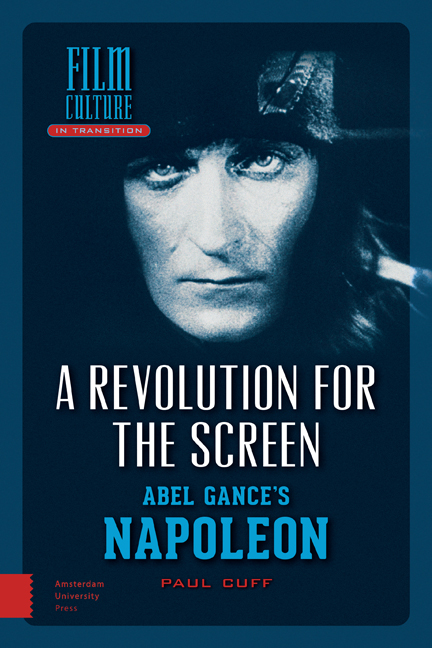Book contents
- Frontmatter
- Dedication
- Contents
- List of Illustrations
- Note on Formatting
- Acknowledgements
- Foreword
- Preface: Critical perspective
- 1 Napoleonic Ambition and Historical Imagination
- 2 Shaping Expectations: The Young Napoléon Bonaparte
- 3 Civilization and Savagery: Visions of the French Revolution
- 4 Mortal Gods: Voices of Power and of Providence
- 5 The Dark Light of Napoleonic Cinema
- 6 A View from the Margins of History
- 7 Melodrama and the Formulations of Family
- 8 Worlds in Transition: Class, consumption, Corruption
- 9 Death and Transfiguration
- Conclusion: The Case for Enthusiasm
- Filmography and Bibliography
- Index
- Film Culture in Transition
1 - Napoleonic Ambition and Historical Imagination
Published online by Cambridge University Press: 10 December 2020
- Frontmatter
- Dedication
- Contents
- List of Illustrations
- Note on Formatting
- Acknowledgements
- Foreword
- Preface: Critical perspective
- 1 Napoleonic Ambition and Historical Imagination
- 2 Shaping Expectations: The Young Napoléon Bonaparte
- 3 Civilization and Savagery: Visions of the French Revolution
- 4 Mortal Gods: Voices of Power and of Providence
- 5 The Dark Light of Napoleonic Cinema
- 6 A View from the Margins of History
- 7 Melodrama and the Formulations of Family
- 8 Worlds in Transition: Class, consumption, Corruption
- 9 Death and Transfiguration
- Conclusion: The Case for Enthusiasm
- Filmography and Bibliography
- Index
- Film Culture in Transition
Summary
Bonaparte is no longer the real Bonaparte, but a legendary figure fashioned from poets’ whims, soldiers’ tales, and popular legend; it is a Charlemagne or Alexander of medieval epic we behold today. This hero of fantasy will become the real individual; the other portraits will vanish. (Chateaubriand 1849-50: VII/126)
Introduction
Interpretations of Gance's film are often determined by critics’ ‘prejudicial hostility’ towards the historical Napoléon (Icart 1983: 178). Steven Englund argues that there is a tendency among Anglophone scholars to pursue an ‘inaccurate, anachronistic, and […] unfair’ comparison of Napoléon with Hitler and Stalin, in spite of the fact that the Emperor was neither ‘invoked’ by French, German, or Italian fascists nor by Russian communists, in the twentieth century (2004: 459). It is a common assumption that the ‘sinister’ legacy of Napoléon in some way sullies Gance's film and that its portrait necessarily contains a ‘dangerous’ doctrine (Samuels 2004: 267). Such views attribute NAPOLÉON with vague notions of ‘the political’ (definite article, indefinite meaning) and categorize it according to simplistic binaries of ‘left’/‘right’ or ‘reactionary’/‘progressive’.
This ahistorical approach is unhelpful. As Norman King points out, the ‘political’ stance of European intellectuals like Gance in the 1920s was characterized by a cross-fertilization of ideas which renders terms like ‘left’ and ‘right’ obsolete (1984a: 140-6). It is equally important to challenge the view that interpretations of Napoléon were in any way consistent: he inspired an astonishingly diverse, and often entirely antithetical, set of ideologies. As Joseph Fouché told the Emperor during his reign: ‘some say you are a god, others that you are a devil; but everyone agrees you are more than a man’ (1824: I/182). After his death, Napoléon was ‘transformed into a mythical figure, an equivalent to those other Romantic archetypes of transgression and limitless desire: Faust, Satan, Prometheus, and Don Juan.’ (Bainbridge 2005: 451) This chapter outlines the history of Napoleonic messianism through the nineteenth and early twentieth centuries, locating Gance's film within the cultural context of Romantic ideology and the political legacy of the Great War.
- Type
- Chapter
- Information
- A Revolution for the ScreenAbel Gance's Napoleon, pp. 31 - 54Publisher: Amsterdam University PressPrint publication year: 2015



